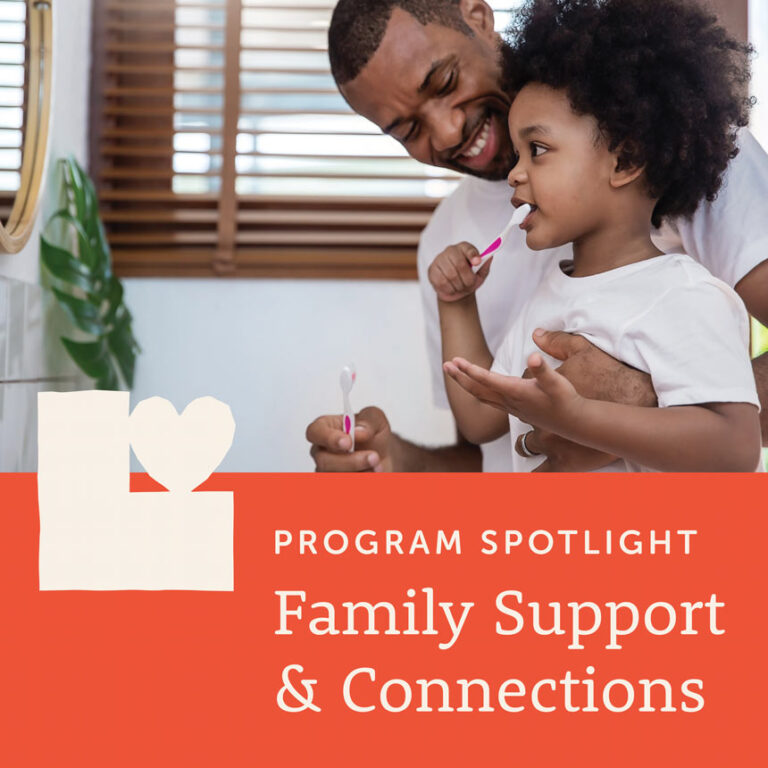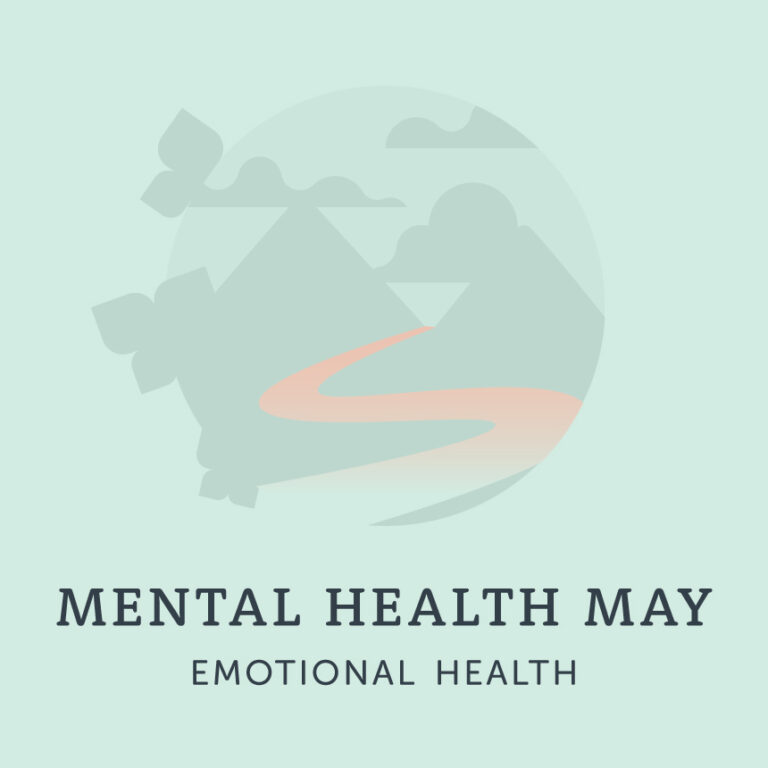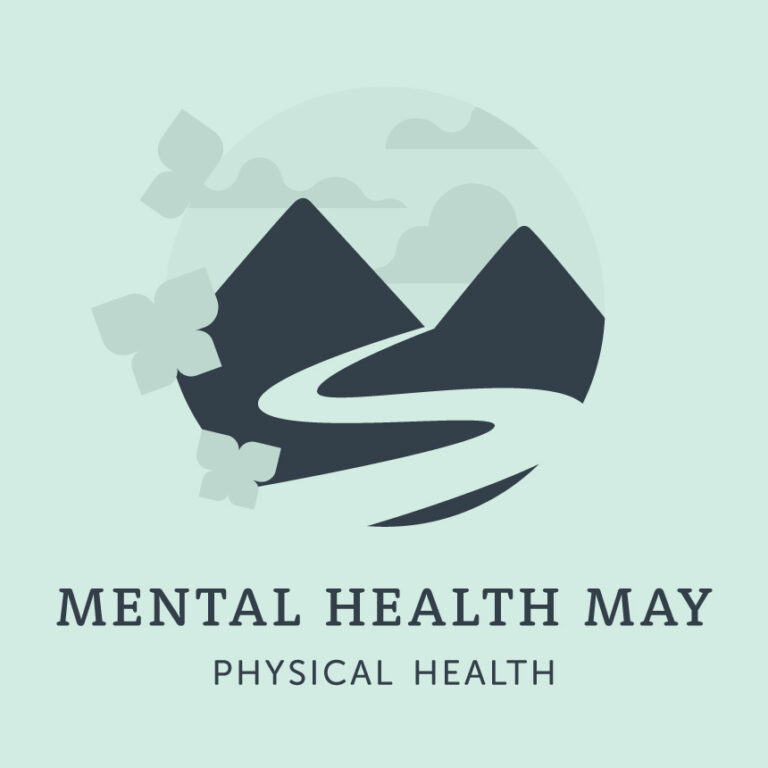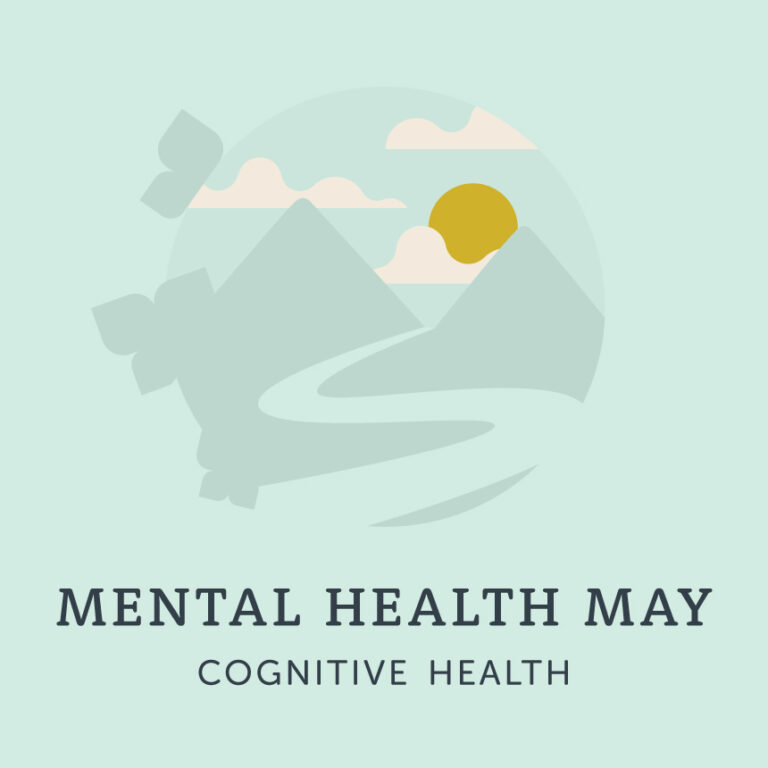
By Elle Holzman
Hello, my name is Elle, and I am an occupational therapy (OT) student intern with Washington County’s Early Assessment and Support Alliance (EASA) program. For those readers who may not be familiar with OT, OT practitioners help people engage in activities that occupy their time and are meaningful to them. Sleep is one of those activities.
As a graduate student, there have been many times when I haven’t gotten as much sleep or haven’t gotten as restful sleep as my body needed. Whether it’s from staying up late studying or restless sleep because I am worried about giving a presentation the next day, I always notice a change in my mental health when I don’t get the amount and quality of sleep I need. Our bodies depend on sleep to recover from all their work while awake. Therefore, sleep is essential to our well-being, and in this article, I will go through some of the benefits of sleep, the role it can play in our mental health experiences, and then provide some tips for how you may be able to improve your own sleep!
Benefits of Good Sleep
Before diving into some of the benefits of sleep, I think it’s important to mention what good sleep may look like for people. When thinking about the number of hours you sleep per night, one size does not fit all. The American Academy of Sleep Medicine recommends adults get at least 7 hours of sleep regularly, 8-10 hours for children and teens, and between 7-8 for older adults (65 years and up). That being said, some people may need more or less than the recommended amount.
Recognizing how your body feels after sleeping will help you identify whether you slept well or poorly. For example, if you feel rested when you wake up, that is a sign that your body got enough sleep to help you navigate the hours you spend awake.
On the other hand, if you wake up feeling tired, have a hard time concentrating, feel more irritable, struggle to remember things, etc., that is a sign that your body did not get the sleep it needs. Click HERE to learn more about sleep.
While there are many benefits to getting good sleep, a crucial benefit is having a stronger immune system. While you sleep, your body gets to work creating T-cells, also known as white blood cells. Our body’s ability to produce enough white blood cells is critical to fighting illnesses like colds, the flu, COVID-19, etc. People who get good sleep also have a reduced risk of developing physical health conditions such as heart disease, diabetes, high blood pressure, kidney disease, stroke and more during their lives.
Another benefit to getting good sleep is maintained and/or improved social health. While everyone has their own levels and amount of socialization that are best for them, humans are social beings and engaging in the right amount of social interaction is important. In 2018, researchers at the University of California Berkeley found using brain scans of sleep-deprived people that the parts of their brains that would typically encourage social interaction were diminished compared to when they were well rested. They also found that when people were sleep deprived, their brains more often perceived people approaching them as a threat and kept others at a distance (18-60% further away) compared to when they were well-rested.
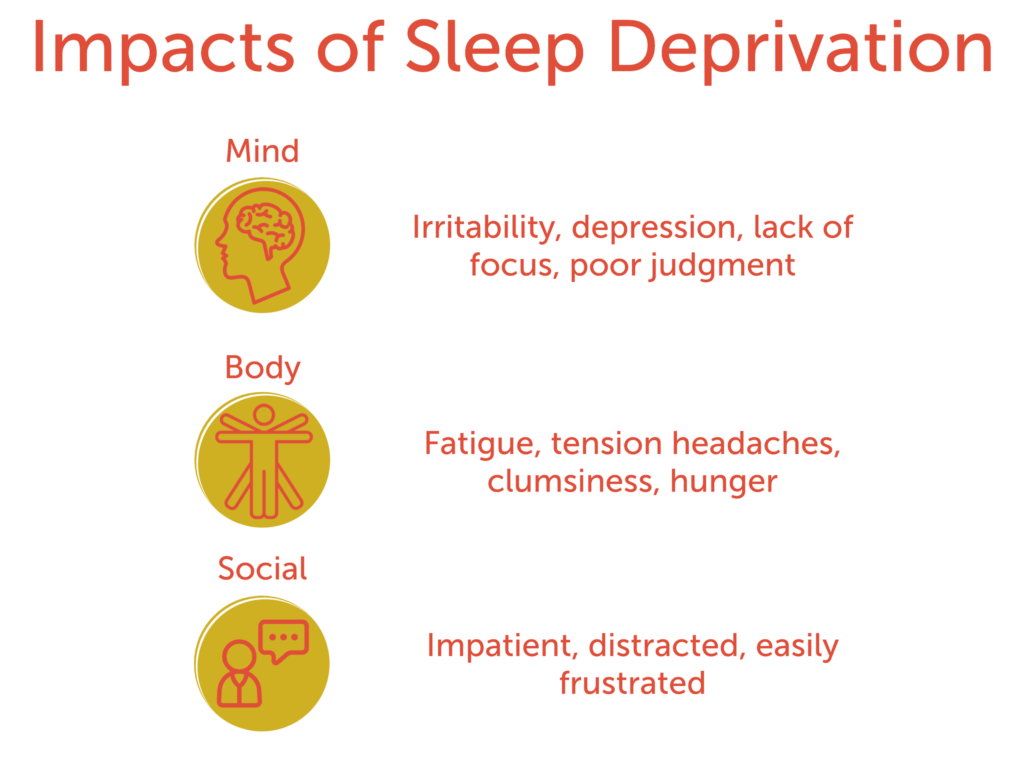
Sleep’s Role in Mental Health
The department of psychiatry at Columbia University reports that not getting enough, or good enough, sleep has been shown to increase the likelihood of responding to stressors negatively and makes coping more challenging, even with stressors typically seen as mild or manageable. Essentially, sleep deprivation can lower a person’s threshold for managing stressful events, kicking the body into fight-or-flight mode more often. This then leads to dysregulated sleep-wake cycle and cortisol production, keeping cortisol in the body longer and potentially causing long-term health impacts from the constant presence of cortisol in the body’s system. Click HERE to see an infographic on some of the impacts of stress on the body.
A study with 22,330 adults from 13 different countries published in 2021 revealed that 1 in 3 study participants reported experiencing symptoms of clinical insomnia, and roughly 20 percent of the study participants met the diagnostic criteria for insomnia disorder. The study also linked disturbed sleep with an increased level of psychological distress. Psychological distress can increase a person’s risk of experiencing anxiety, depression, social withdrawal, psychosis, and potentially leads to engaging in unhealthy coping behaviors.
Many people who experience mental health challenges also experience disturbed sleep, and those who experience disturbed sleep are much more likely to experience mental health challenges. It’s a vicious cycle that can have severe impacts on your day-to-day functioning, if not addressed effectively. Getting adequate sleep can help reduce the risk of excess levels of the hormone cortisol in your body. Cortisol is commonly known as the stress hormone, one of the hormones your body produces to engage in its fight-or-flight response. While the production of cortisol is a natural and healthy bodily function, having an excess of it in your body can have serious impacts on your physical and mental health.
Have you ever woken up from a sleepless or restless night and felt like you were moving at the pace of a tortoise or struggled to focus during work? Well, sleep has a crucial role in the upkeep of skills like attention, judgment, learning, decision-making, problem-solving, communication, memory, emotional-processing, and more. Not being able to perform skills that a.) you typically have performed well, and b.) are required of you, can take a toll on your self-esteem, negatively impacting your mental health. Click HERE to watch a video discussing how sleep affects your emotions.
So, as you can see, getting good sleep is critical in supporting good mental health .
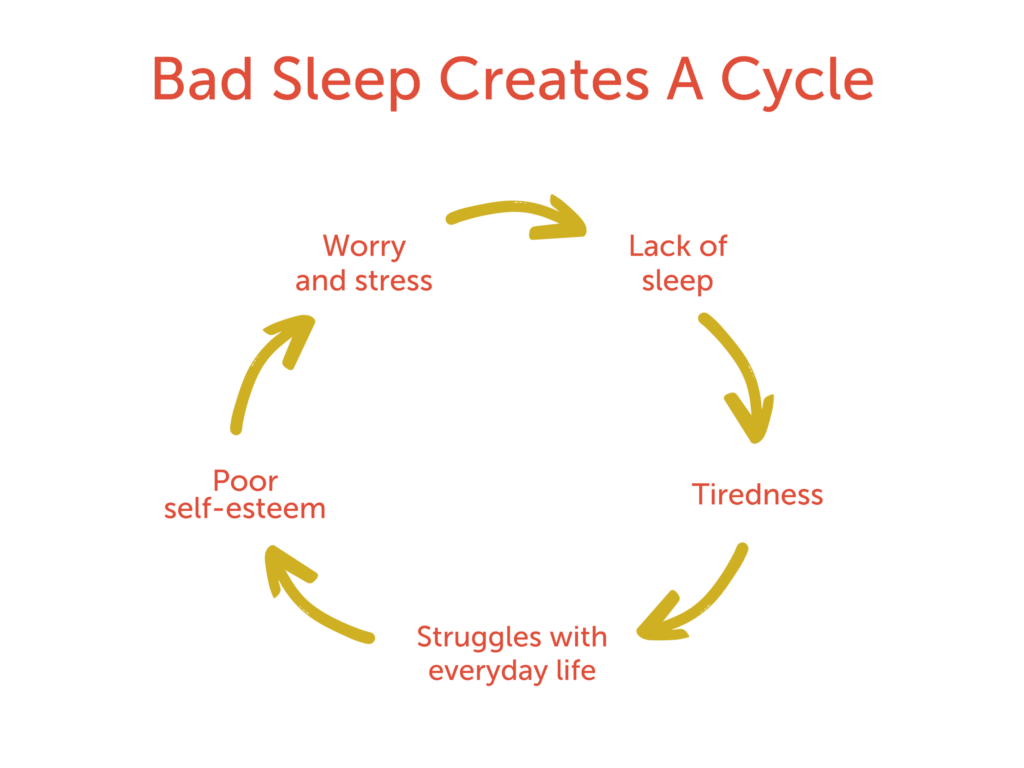
How Can You Get Better Sleep?
Here are a few ways to get the most out of your sleep. While these ways can help you get better sleep, it’s also important to remember that not every option works for everyone, and that’s OK. It’s about finding what works for you and your life, which can sometimes look like a trial-and-error process. Don’t feel the need to try to change everything all at once. It can be helpful to start with one new thing, and then when it feels like a solid part of your routine, add another strategy you’re interested in trying.
- Avoid engaging in activities that increase your heart rate (i.e., running, lifting weights, swimming, etc.) a few hours before bed. These kinds of activities assist in the production of chemicals like adrenaline, which can make you feel hypervigilant and ready to react to any potential threats, making falling asleep more challenging.
- Create a consistent schedule where you are waking up and going to bed at the same time, even on days when you don’t have plans. I know that is not always feasible for people, and I by no means wake up and go to bed at the same time every day. However, having a consistent schedule helps your body recognize when it’s time to get up and when it’s time to wind down. This consistency also helps your body regulate the production of the chemical melatonin, which facilitates your body’s sleep-wake cycle.
- Avoid things that have caffeine, nicotine, and alcohol in them in the hours leading up to going to sleep. Caffeine and nicotine are stimulants, so they may make it harder for you to fall asleep if used too close to bedtime and alcohol interferes with neurochemicals and hormones responsible for regulating your sleep-wake cycle, causing you to not have as restful sleep.
- If you enjoy naps, aim to keep your naps to no more than 30 minutes in the earlier part of your day to mitigate the risk of your body’s sleep drive decreasing too close to the time you go to sleep.
- Keep your sleeping space separate from your living space. Our brains have an incredible way of making associations between the things we are doing and where we are doing them. So, for example, if you work from home and have converted your bedroom into your workspace, you may have a more challenging time sleeping because your brain associates your bedroom with being alert and focused or even stressed and overwhelmed.
- Create a sleep space that is cool, dark and quiet. An ideal room temperature for adults is between 60- and 67-degrees Fahrenheit. If you have windows in your room, closing the blinds and curtains while you sleep will help keep out any light that may have a hand in disturbing your sleep.
- Implement a “wind-down” routine in the hour or two leading up to going to sleep. A wind-down routine can cue our bodies to start getting ready for sleep. Some examples of wind-down routines are:
- Turning overhead lights down or off
- Doing some yoga poses
- Listening to soothing music
- Taking a warm shower or bath
- Drink a cup of herbal tea
- Meditating
- Journaling
Click HERE to see an infographic on sleep with some of the tips outlined above.
Thanks for reading and remember, sleep is your superpower for overall well-being!
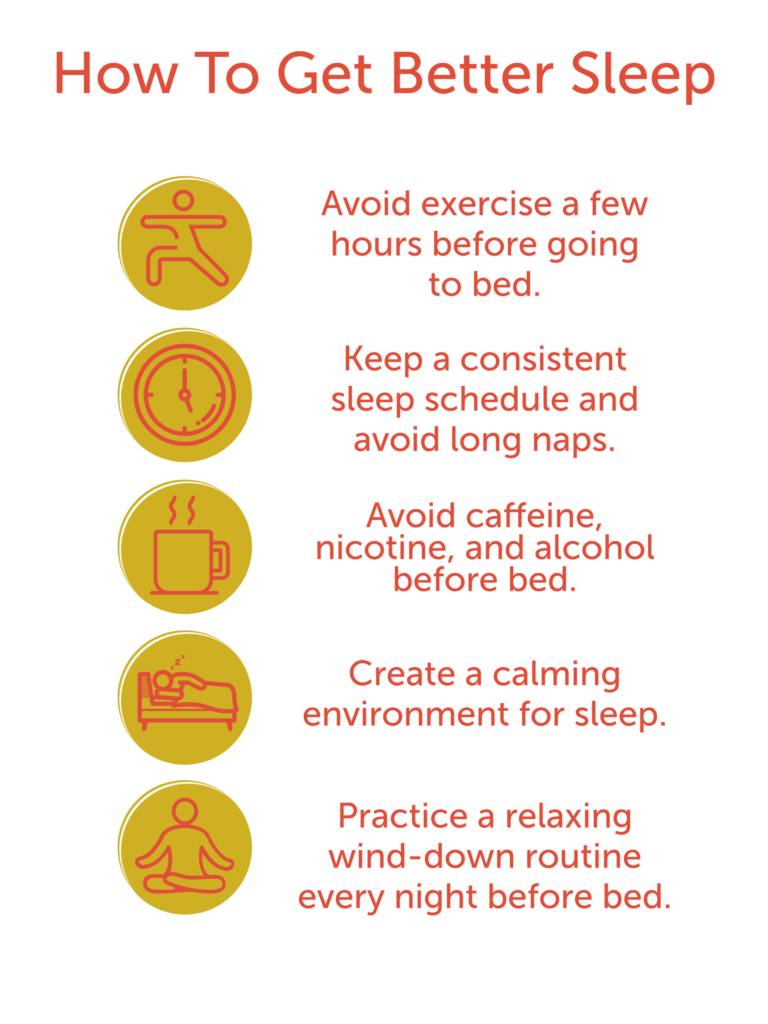
References
Brain Basics: Understanding Sleep | National Institute of Neurological Disorders and Stroke. (2022). https://www.ninds.nih.gov/health-information/public-education/brain-basics/brain-basics-understanding-sleep
Get Enough Sleep – MyHealthfinder | health.gov. (2021, August 1). https://health.gov/myhealthfinder/healthy-living/mental-health-and-relationships/get-enough-sleep
How poor sleep can ruin your social life. (2018, August 22). University of California. https://www.universityofcalifornia.edu/news/how-poor-sleep-can-ruin-your-social-life
How Sleep Deprivation Impacts Mental Health. (2022, March 16). Columbia University Department of Psychiatry. https://www.columbiapsychiatry.org/news/how-sleep-deprivation-affects-your-mental-health
Morin, C. M., Bjorvatn, B., Chung, F., Holzinger, B., Partinen, M., Penzel, T., Ivers, H., Wing, Y. K., Chan, N. Y., Merikanto, I., Mota-Rolim, S., Macêdo, T., De Gennaro, L., Léger, D., Dauvilliers, Y., Plazzi, G., Nadorff, M. R., Bolstad, C. J., Sieminski, M., . . . Espie, C. A. (2021). Insomnia, anxiety, and depression during the COVID-19 pandemic: an international collaborative study. Sleep Medicine, 87, 38–45. https://doi.org/10.1016/j.sleep.2021.07.035
Queensland Government. (2018, March 14). 7 amazing things that happen to your body while you sleep. Queensland Health. https://www.health.qld.gov.au/news-events/news/7-amazing-things-that-happen-to-your-body-while-you-sleep
Seven or more hours of sleep per night: A health necessity for adults. (2017, November 7). American Academy of Sleep Medicine – Association for Sleep Clinicians and Researchers. https://aasm.org/seven-or-more-hours-of-sleep-per-night-a-health-necessity-for-adults/
Sleep and Mental Health: Why Our Brains Need Sleep. (2019). Primary Care Collaborative. https://www.pcpcc.org/resource/sleep-and-mental-health-why-our-brains-need-sleep
Summer, J. (2022, April 15). Eight Health Benefits of Sleep. Sleep Foundation. https://www.sleepfoundation.org/how-sleep-works/benefits-of-sleep
Suni, E. (2022, November 4). Mental Health and Sleep. Sleep Foundation. https://www.sleepfoundation.org/mental-health
The Science of Sleep: Understanding What Happens When You Sleep. (2021, August 8). Johns Hopkins Medicine. https://www.hopkinsmedicine.org/health/wellness-and-prevention/the-science-of-sleep-understanding-what-happens-when-you-sleep




